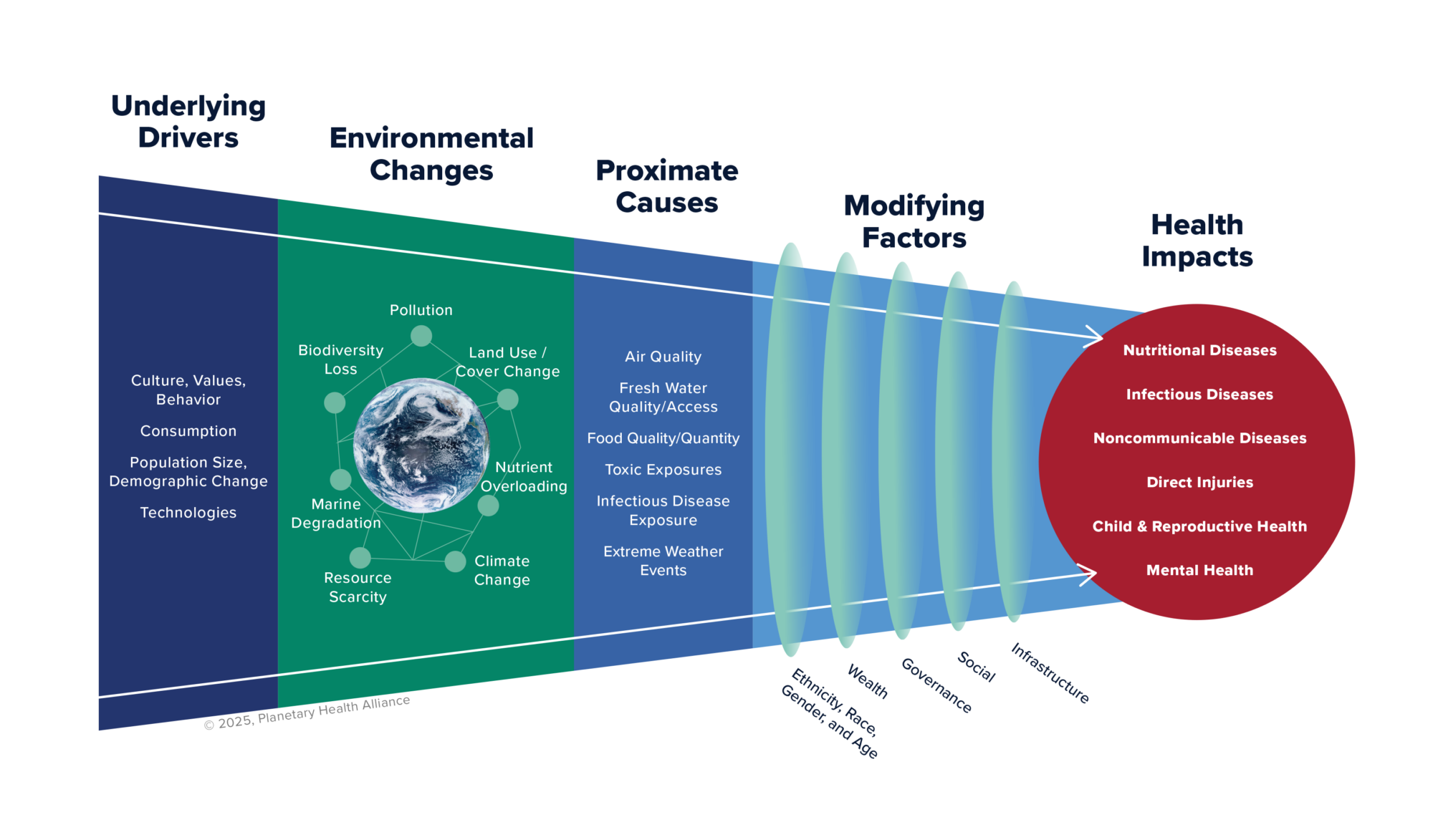DOWNLOAD PLANETARY HEALTH INFOGRAPHICS
Understanding Planetary Health Pathways
This illustration demonstrates how underlying drivers contribute to environmental changes, which ultimately impact human health.
Communicating about Planetary Health
Use this image to help convey key pathways in Planetary Health

This graphic illustrates how human activities affect Earth’s natural systems and how those human-caused environmental changes, along with many modifying factors that determine severity and outcomes, affect human health.
- Underlying Drivers: Behavioral and societal choices are underlying drivers that contribute to an array of environmental changes. These include culture and values and how they shape behavior; consumption patterns and resource use; population growth and shifts in demographics; and new and increasing use of technologies, such as agriculture and industrialization. These underlying drivers of change occur at large scales and transform our natural systems, changing fundamental conditions for human health and well-being.
- Environmental Changes: These changes are taking place across the following Earth systems: disruption to the global climate system; widespread pollution of air, water, and soils; rapid biodiversity loss; reconfiguration of biogeochemical and nutrient cycles, including those of carbon, nitrogen, and phosphorus; pervasive changes in land use and land cover; resource scarcity, including that of fresh water and arable land; and biophysical ocean changes, including increases in temperature and acidity of the oceans.
- Proximate Causes: Proximate causes reflect the ways those changes in environmental systems interact and create exposures which can harm or benefit health and well-being. As a few examples, pollution from the creation of consumer goods can affect the quality of the air we breathe. Nutrient overloading in farming practices and overuse of scarce resources can limit access to clean water.
- Modifying Factors: Modifying factors affect the extent to which those proximate causes translate into health impacts. For example, the way in which toxic exposures harm child and reproductive health may vary based on such characteristics as ethnicity, gender, and age. Similarly, how people are affected by an extreme weather event will vary based on their wealth and the social system, governance policies, and infrastructure where they live.
- Health Impacts: These changes to our planet and in our lives affect every dimension of our—and our communities’— health and well-being, including nutritional status, infectious diseases, non-communicable diseases, reproductive health, injuries, and mental health outcomes.
Interconnections
Each variable is deeply intertwined with others. Changes in one element trigger cascading effects across multiple systems simultaneously. This non-linear complexity—where nature and human activities continuously influence each other through feedback loops—forms the core of Planetary Health science and knowledge generation. This field works to understand these relationships and identify regenerative solutions that benefit both human health and the natural systems on which it depends.
Interventions
When looking at interventions to advance Planetary Health, it is important to consider the key pathways for change:
- Drivers, as opportunities for mitigation or prevention of environmental harm, and
- Modifying factors, as ways we can support adaption or minimize the adverse health effects of environmental change.
Access Infographics
There is also a version of the image that uses the Planetary Boundaries framework to summarize Earth system changes.

Planetary Boundaries Schematic PNG (140KB)
Planetary Boundaries Schematic PDF (100KB)
Graphic modified in 2025 from:
Myers, S.S., 2017. Planetary health: protecting human health on a rapidly changing planet. The Lancet, 390(10114), pp.2860-2868
Duff H., Faerron Guzmán, C., Almada, A., Golden, C., and Myers, S. “Planetary Health Case Studies: An Anthology of Solutions”. PHA, Boston, USA. 2020; https://doi.org/10.5822/phanth9678